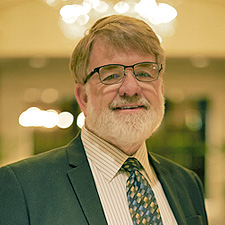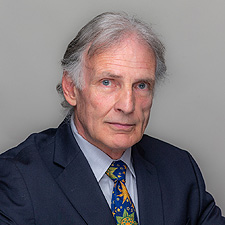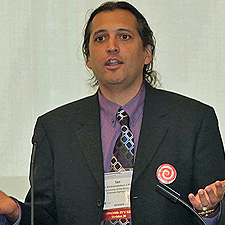Latest research and technological advances in the understanding of brain functions and neuroscience
for Psychology and Psychiatry professionals of the Baltic States and Finland
for Psychology and Psychiatry professionals of the Baltic States and Finland
Addicere Psychological Consultation Agency in collaboration with Peak Neuropsychology is proud to invite 40 participants to the Neuroscience Advanced Training Program.
The training is designed by Dr David Stephens, Psy.D to provide a synthesis of the latest research and technological advances in the understanding of brain functions and neuroscience.
This unique training program is your chance to acquire the latest information on functional connectivity, consciousness, and the neural foundations of emotions. You will learn and practice methods of intervention that help people with difficult-to-treat disorders which have been historically considered permanent and unchangeable.
As a participant, you will be part of a small group of professionals (40 participants in online seminars and two groups of 20 participants in an on-location training) to learn and exchange experiences with 4 exceptional and highly accomplished researchers and practitioners from the USA.
The course consists of 15 online seminars and 3 full-length contact training days on location in Tallinn, Estonia.
Don’t miss out on the latest research and technological advances in brain function and neuroscience.
Participant Registration
Deadline: 26th February, 2023
Online Trainings
Dates: 2, 9, 16, 23 & 30th March
Time: 16:00-18:00
Total: 14 acad. hours
Online Trainings
Dates: 6, 13, 20 & 27th April
Time: 16:00-18:00
Total: 11 acad. hours
Online Trainings
Dates: 4, 11, 18 & 25th May
Time: 16:00-18:00
Total: 11 acad. hours
Online Trainings
Dates: 1 & 8th June
Time: 16:00-18:00
Total: 6 acad. hours
3-day On-Location Training
Dates: 13-15th or 20-22nd of June
Time: 9:00-17:00
Total: 24 acad. hours

Dr David Stephens,Psy.D
David is a Doctor of Psychology, an published author, expert in Mental Health and Neuropsychology with over 20 years of senior management, academical and clinical experience. David is the former Dean of University of the Rockies, School of Professional Psychology.
Read more ...
He received his doctorate in clinical psychology from the University of Denver and is a certified practitioner of Cognitive Behavior Therapy and Dialectical Behavior Therapy. In addition David is a member of the editorial board of the Journal of Correctional Health Care and a partner of Falcon Correctional and Community Services, an organization reforming the mental health aspects of US correctional system.
David is the former dean of the School of Professional Psychology at the University of the Rockies in Colorado, a member of the US Commission on Correctional Mental Health, and the former director of mental health for the Colorado, Missouri and Wyoming Department of Corrections.
David is an author of Foundations of Respectful Parenting (2017); Despondency: The Real Pandemic (2020).

Dr Jim Grigsby, Ph.D
Jim is a faculty member in the CU Denver Psychology Department, where he teaches Cognitive Neuroscience/Neuropsychology. He was a co-discoverer of the Fragile X-Associated Tremor/Ataxia Syndrome, which he has studied for over 20 years.
Read more ...
Jim also has a part-time appointment in the CU Denver School of Medicine, Department of Medicine, Division of Health Care Policy and Research, where he was a research scientist from 1992. He was a co-discoverer of the Fragile X-Associated Tremor/Ataxia Syndrome, which he has studied for over 20 years. He has an active research lab in which he works with both graduate and undergraduate students.
In recent years, his primary interests have been in cognitive neuroscience, especially executive functioning, FXTAS, the gut-brain axis, and the psychotherapeutic uses and mechanism of psychedelic drugs and 3,4- methylenedioxymethamphetamine (MDMA). He has had funding from NIH (NIA,NINDS, and NIDCD) and several other federal, state, and private agencies and organizations, including the Centers for Medicare and Medicaid Services (CMS), Health Resources and Services Administration (HRSA), Department of Defense (DOD), Office for the Advancement of Telehealth (OAT), and the Robert Wood Johnson Foundation.

Dr Debora Scheffel, Ph.D
Debora is the Dean of the School of Education, Colorado Christian University. She previously served as Dean of Research, University of the Rockies (Denver, CO), and Dean of the School of Education, Jones International University (Centennial, CO).
Read more ...
She has held a tenured professorship at the University of Northern Colorado (Greeley, CO), and served as Director of Competitive Grants and Awards and Literacy Grants and Initiatives at the Colorado Department of Education, as well as Special Assistant to the Commissioner of Education in Colorado, in Literacy. She has also been a visiting scholar at the United States Air Force Academy.
Dr Debora Sheffels academic background is in Communication Sciences and Disorders and special education with research interests in Cognitive Psychology, brain-behavior relationships and learning. She has worked in six states in a variety of post-secondary educational contexts and is a published author in literacy, special education, and higher education assessment. Her professional affiliations include the International Neuropsychological Society, the International Dyslexia Association, and the Council for Exceptional Children.

Dr Ian Wickramasekera, Psy.D
Ian is a Fellow of the American Psychological Association (APA), he is the winner of the Clark L. Hull Award and the Milton H. Erickson Award for Scientific Excellence in Clinical Hypnosis from the American Society of Clinical Hypnosis.
Read more ...
Dr Ian Wickramasekera has a lifelong fascination with topics such as Affective Neuroscience, Biofeedback, Bon-Buddhism, Empathy, Hypnosis, Lucid Dreaming, Mind/Body Medicine, and Transpersonal Psychology.
His research into these areas has won him a number of awards among other the Distinguished Early Career Contributions to Hypnosis award from the American Psychological Association as well as from the American Society of Clinical Hypnosis.
He was confirmed to be a Fellow of the American Psychological Association in 2018 by the Fellows Committee of APA. Less than 5% of psychologists hold this honor for outstanding and unusual contributions to the science and practice of psychology and even fewer of them are people of color. Dr. Ian enjoys biking, hiking, making music, meditating, and running when he isn’t at work and/or reading an obscure tome of ancient lore.
"Appropriate fueling of the brain is necessary to maintain full physical, emotional, cognitive, and relational function."
- Dr David Stephens, Psy.D
You will learn the latest detailed information on topics such as functional connectivity, consciousness, and the neural foundations of emotions. The course emanates from a strong scientific foundation and is designed for the professional community of psychiatrists and psychologists. The course also welcomes educators, mental health and healthcare professionals to participate.
Far from being an impractical journey into the depths of the brain and complex neurochemistry, the training will provide you with skills to better understand the brain itself, your students, your patients, or your clients. The training includes methods for intervention that help people with difficult-to-treat disorders that have historically been considered permanent and unchangeable.
Dr Stephens, the creator of this course and the keynote instructor, has a strong clinical and academic background and understands the benefits of interaction and learning from each other in a course such as this one. Rich case histories will be interwoven into the technical material, highlighting the practical, clinical nature of the content being presented.

Current models continue to include localizationism, as well as the much more recent understanding of the brain’s predictive approach to many brain and body functions.
The brain is responsible for all human functions. This topic will address the brain’s role in pain production and management, disease management, and the more traditionally identified roles in cognition, emotion, and behavior.
Much of current neuroscience and clinical understanding comes from the micro perspective of neuroanatomy, cellular functioning, and the role of neurotransmitters in brain function. This topic will cover the macro functions that drive the micro functions of the brain.
In order to understand brain and overall human functioning it is vital to understand how brain fueling is required if the brain is to function at the level of its capability.
The domains of brain function that will be covered by this topic are the Emotional Domain, the Relational Domain, the Behavioral Domain, the Cognitive Domain, and the Identity Domain.
The complex interaction between brain function, brain injury, and addiction will be presented. Addiction functions as a protective mechanism for the brain, which explains its power and the difficulties achieving recovery. Treatment strategies for addiction will be presented.
There is a significant recent increase in autism research, including the prevalence of autism in the correctional environment. This research and the growing understanding of the dynamics of autism will be presented. Treatment and intervention strategies for autism will be presented.
Dementia has long been identified as a brain illness or disorder, but the prevalence and mechanisms of dementia need to be understood if it is to be treated and managed appropriately. Treatment and intervention strategies for dementia will be presented.
Concussive injuries affect neurochemistry much more than they do actual brain tissue or structures within the brain. They are cumulative in their effect, which is critical to understand in diagnosing and treating them. Treatment strategies for concussions will be presented.
Traumatic brain injuries, excepting those which result in significant tissue and cellular loss and destruction and essentially more severe versions of concussions, and also primarily affect neurochemistry rather than brain tissue and structures. Treatment strategies for traumatic brain injuries will be presented.
The understanding of the mechanisms of seizures is continuing to grow. The newest research will be presented, along with a discussion of the role of brain fueling in the development of seizures. Treatment strategies for seizures will be presented.
There is a relatively recent and growing professional interaction between architecture and neuroscience. Buildings and their design (including furnishings) have great impact on brain function and brain recovery. Clinical professionals need to understand the role the built environment plays in hospitals, clinics, and even outpatient offices.
The ways in which the brain learns, beginning in infancy and continuing throughout the life span, is a topic of much recent interest and research. An understanding of learning processes includes understanding consciousness, predictive modeling, and other functions.
Research is now confirming that brains (and bodies) can recover from many conditions and injuries that were once thought untreatable. The specifics of recovery will be presented in this topic, along with strategies for encouraging and achieving brain recovery for a number of conditions.
* The trainers reserve the right to make slight changes in the course topics depending on the group preferences.
"There are several exemplar functions of interoception, including energy regulation (ingestion and excretion), memory, affective and emotional experience, and the psychological sense of self. Multimodal integration occurs across interoceptive modalities and between interoceptive and exteroceptive modalities."
- Dr Lisa Feldman Barrett, Ph.D
Certificate of passing the course will be issued to those who participated at least 80% of the online trainings, 90% of the in-person trainings and passed the course exam.
Anyone participating to a lesser extent and/or not passing the exam, will receive certificate of participation.
Online training will be held in Zoom. The Zoom link will be sent to all participants e-mail that was used to register.
Help with Zoom setup will be provided by of our Project Manager 1 week prior to the start of the program upon your request. Please notify us that you need help with setting up Zoom by e-mailing us at koolitus@addicere.com.
Recordings of the online trainings will be available for the registered participants up to one week after each course date upon request.
On-location training will be held in Addicere Training Centre at Narva mnt 63, Tallinn, Estonia.
Coffee breaks, light snacks and lunch will be served throughout the 3 days on training location. We are partnering with the Restaurant BACIO to provide our participants with the best quality light snacks and lunch menu. If you are in need of special menu, please also notify our Project Manager at koolitus@addicere.com, at least 2 week before on-location training starts.
Participants have to organize their own accommodations while in Tallinn. We have an ongoing partnership with Palace Hotel Tallinn 4* (a member of Radisson Individuals) and our Project Manager can help you with accommodations if needed at koolitus@addicere.com.
Parking near the training venue is regulated by the City of Tallinn and the parking-zone is marked "KESKLINN" (1.50€ per hour)
The course is designed for a group of 40 participants. All 40 registered participants will take part of the Online training together from March to June. But for the On-location training starting in June the group will be split into two 20 participants groups.
Group I size: 20 people - On-Location training time: 13-15th of June
Group II size: 20 people - On-Location training time: 20-22nd of June
Course total volume is 66 academical hours, plus 6 academical hours of individual work.
Online Zoom training - 15 weeks – 42 academical hours
Practical in-person training - 3 days - 24 academical hours
The whole training course program is an equivalent to 3 ECTS corresponding with Masters and Doctoral level graduate study.
Price for all participants' is 2300 € (including VAT).
We accept all major Credit Cards, online Bank Transfers and can also make an Invoice out to your organization or company. Your registration is completed when the payment is finalized.
For information on cancelation and refund see our Cancellation and Refund Policy. on related questions contact our Project Manager at koolitus@addicere.com.
Certificate of passing the course will be issued to those who participated at least 80% of the online trainings, 90% of the in-person trainings and passed the course exam.
Anyone participating to a lesser extent and/or not passing the exam, will receive certificate of participation.
Online training will be held in Zoom. The Zoom link will be sent to all participants e-mail that was used to register.
Help with Zoom setup will be provided by of our Project Manager 1 week prior to the start of the program upon your request. Please notify us that you need help with setting up Zoom by e-mailing us at koolitus@addicere.com.
Recordings of the online trainings will be available for the registered participants up to one week after each course date upon request.
On-location training will be held in Addicere Training Centre at Narva mnt 63, Tallinn, Estonia.
Coffee breaks, light snacks and lunch will be served throughout the 3 days on training location. We are partnering with the Restaurant BACIO to provide our participants with the best quality light snacks and lunch menu. If you are in need of special menu, please also notify our Project Manager at koolitus@addicere.com, at least 2 week before on-location training starts.
Participants have to organize their own accommodations while in Tallinn. We have an ongoing partnership with Palace Hotel Tallinn 4* (a member of Radisson Individuals) and our Project Manager can help you with accommodations if needed at koolitus@addicere.com.
Parking near the training venue is regulated by the City of Tallinn and the parking-zone is marked "KESKLINN" (1.50€ per hour)
The course is designed for a group of 40 participants. All 40 registered participants will take part of the Online training together from March to June. But for the On-location training starting in June the group will be split into two 20 participants groups.
Group I size: 20 people - On-Location training time: 13-15th of June
Group II size: 20 people - On-Location training time: 20-22nd of June
Course total volume is 66 academical hours, plus 6 academical hours of individual work.
Online Zoom training - 15 weeks – 42 academical hours
Practical in-person training - 3 days - 24 academical hours
The whole training course program is an equivalent to 3 ECTS corresponding with Masters and Doctoral level graduate study.
Price for all participants' is 2300 € (including VAT).
We accept all major Credit Cards, online Bank Transfers and can also make an Invoice out to your organization or company. Your registration is completed when the payment is finalized.
For information on cancelation and refund see our Cancellation and Refund Policy. on related questions contact our Project Manager at koolitus@addicere.com.
"The biological underpinnings of specific psychiatric and neurological disorders have been outlined, and these findings have directly led to improvements in medical, psychological, and behavioral interventions for the various disorders."
- Dr Rowland W. Folensbee, Ph.D
